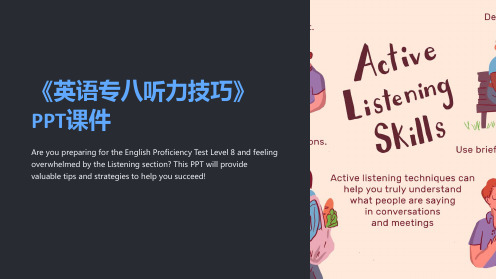英语专业8级标准听力-BBC News_98【声音字幕同步PPT】
《英语专八听力技巧》课件

Practice
Practice listening to recordings and taking notes quickly and accurately to improve your skills.
Common Mistakes to Avoid
1 Spelling Errors
Double-check your spelling to avoid losing points for spelling errors.
1 Assuming Information
Don't assume the missing information in the conversation; it may be completely different from your understanding.
2 Missing Details
Practice Exercises for Note-taking
Practice taking notes by listening to recordings and reviewing your notes afterwards. Focus on improving your speed and accuracy with each exercise.
Ignoring Context
Understand the context of the dialogue before listing - context clues may help you choice the right option
Guessing
Answer confidently and don't guess the answer based solely on incomplete information.
专八标准听力1000题-Model Test 01【声音字幕同步PPT】

Generally, it is agreed that no one version is correct,
however, there are certainly preferences in use.
The three major differences between American and British English are: pronunciation differences in both vowel
in standard American English. Other differences involving the use of the
present perfect in British English and simple past in American English include already, just and yet. In British English: I've just had lunch.
burnt OR burned, dream dreamt OR dreamed, learn learnt
OR learned,
smell smelt OR smelled, spell spelt OR spelled,
spill spilt OR spilled, spoil spoilt OR spoiled. However, the irregular form is generally more common in British English (the first form of the two) and the regular form is more common to American English.
1998年英语专业八级考试听力MP3

1998年英语专业八级考试听力MP3TEST FOR ENGLISH MAJORS (1998)GRADE EIGHTPAPER ONEPART I LISTENING COMPREHENSION (40 MIN)In sections A , B and C, you will hear everything ONCE ONLY, listen carefully a nd then answerthe questions that follow. Mark the correct response for each question on your Colored AnswerSheet.SECTION A TALKQuestions 1 to 5 refer to the talk in this section. At the end of the talk you will be given 15seconds to answer each of the following five questions. Now liste n to the talk.1. According to the talk, compulsive gambling and alcoholic addiction share s imilarities because.A. no actual figure of addicts has been reportedB. no scientific studies have yielded effective solutionsC. both affect all sectors of societyD. both cause serious mental health problems2. The development of the gambling compulsion can be described as being .A. gradualB. slowC. periodicD. radical3. G. A. mentioned in the talk is believed to be a(n) .A. anonymous groupB. charity organizationC. gamblers' clubD. treatment center4. At the end of the talk, the speaker's attitude towards the cure of gambling addiction isA. unclearB. uncertainC. optimisticD. pessimistic5. Throughout the talk, the speaker examines the issue of gambling in a way.A. balancedB. biasedC. detached .D. lengthy-SECTION B INTERVIEWQuestions 6 to 10 are based on an interview with an architect. At the end o f the interview you will be given 13 seconds to answer each of the following five questions. Now listen to the interview.6. What strikes the woman most about the male robber is his .A. clothesB. ageC. physiqueD. appearance7. The most detailed information about the woman robber is her .A. mannersB. talkativenessC. heightD. jewelry8. The interview is believed to be a bank .A. receptionistB. managerC. customerD. cashier9. Which of the following about the two robbers is NOT true?A. Both were wearing dark sweaters.B. Neither was wearing glasses.C. Both were about the same age.D. One of them was marked by a scar.10. After the incident the interviewee sounded .A. calm and quietB. nervous and numbC. timid and confusedD. shocked and angrySECTION C NEWS BROADCASTQuestions 11 to 12 are based on the following news. At the end of the news it em, you will begiven 30 seconds to answer the two questions. Now listen to t he news.11. According to the news, the enormous food shortage in Iraq has the most damaging effecton its ____ .A. national economyB. adult populationC. young childrenD. national currency12. The WFP is appealing to donor nations to .A. double last year's food-aidB. raise $122 million for Iraqi peopleC. provide each Iraqi family with $26 a monthD. help Iraq's 12 million populationQuestion 13 is based on the following news. At the end of the news item, you will be given 15seconds to answer the question. Now listen to the news.13. As s result of the agreement, the two countries' arsenals are to be ____ .A. upgraded in reliability and safetyB. reduced in size and numberC. dismantled partly later this yearD. maintained in their present conditionsQuestions 14 to 15 are based on the following news. At the end of the news it em, you will begiven 30 seconds to answer the two questions. Now listen to the news.14. We can infer from the news that of teenagers under survey in 1993 were drug users.A. 28%B. 22%C. 25%D. 21%15. Which of the following statements is INCORRECT?A. Parents are asked to join in the anti-drug efforts.B. The use of both cocaine and LSD are on the increase.C. Teenagers hold a different view of drugs today.D. Marijuana is as powerful as it used to be.SECTION D NOTE-TAKING AND GAP-FILLINGIn this section you will hear a mini-lecture ONCE ONLY. While listening to the l ecture, take noteson the important points. Your notes will not be marked, but you will need them to complete a15-minute gap-filling task on ANSWER SHEE T ONE after the mini-lecture. Use the blank paperfor note-taking. Fill in each of the gaps with one word. You may refer to your notes. Make surethe word y ou fill in is both grammatically and semantically acceptable.The Rise of RPHistorical reasonsReceived Pronunciation (RP) was originally associated with a (1)spoken in the region between central England and London, including Oxford a nd Cambridge.Its survival was due to its use by the (2) in the 14th century and by university students in the (3) Ages.Its rise in importance resulted from its application in government and official documents.The prestige of its (4) pattern of pronunciation came about with itsuse in (5)_____ schools in the 19th century.As a result, its ( 6 ) is accepted by television and the radio, theprofessions and teaching English as a foreign language.Three characteristics of RP1) its speakers don't regard themselves as connected with any geographical r egion;RP is largely used in England;RP is a "class" accent, associated with (7) social classes.Its present statusDecline in the prestige of RP is the result of a) loss of monopoly of educatio n by theprivileged; b) (8) of high education in the post-war period. However, it still retains its eminence among certain professional people. There is a rise in the status of all (9) accents.We are moving towards the (10) position: general acceptance ofall regional accents and absence of a class accent that transcends all regions.(1) ______ (2) ______ (3) ______ (4) ______ ( 5 ) ______(6) ______ (7) ______ (8) ______ (9) ______ (10) ______听力原文SECTION A TALKOne of the largest mental health problems in the USis that of compulsive ga mbling. Although there areno scientific studies that have discovered the exact number, experts estimate that between 5 and 10million persons are compulsi ve gamblers.Like addiction to alcohol, compulsive gamblingcrosses all social and econo mic lines. Compulsive gamblers can be found in any profession andat any leve l of society. And the addiction affects both men and women.The gambling compulsion usually starts in the early teens. The more often the young gambler indulges in the compulsion, the more obsessive it becomes. B y his early twenties, the averagecompulsive gambler has moved from small bets on such things as football games, horse racesand card games to more ad ult, more expensive gambling forms.For the compulsive gambler, life becomes one continuous gambling binge. The compulsionconsumes the gambling addict to such a point that nothing els e matters, not even health,children or family. Studies by psychiatrists seem to show that compulsive gamblers bet to pulsive gamblers never stop when they are ahead. Instead, they try to win more. Oneimportant character istic of the compulsive gambler is his optimism. Like most human beings,h e does not like to admit defeat. Consequently, he hides his real motivations f or gambling withlarge amounts of enthusiastic optimism. The more deeply he is committed to betting — andlosing — the more fanatical his convictio n that the next bet will make him wealthy.Compulsive gamblers will use almost any means to get money to "feed their a ddiction".Borrowing or stealing from friends or family is the first method gam blers usually employ to getcash. Other common ways to get money are embezzlement, robbery or writing false checks.In recent years, psychiatrists discovered some of the basic reasons for compu lsive gambling.First, compulsive gamblers almost always come from homes la cking in love. As a result, the childgrows up still looking for the warmth of fam ily love and parental approval. Another aspect ofthe nature of the gambling addict is that unconsciously he wants to lose. Psychiatrists believethat compul sive gamblers consciously may expect to win; however, there is a strong ele ment of self-destruction in their inclination to continue betting until all is lo st.One New York psychiatrist believes that basically the compulsive gambler is seeking an answerto the question."Do you love me?" By winning, he receives a "yes" answer. However, thegamb lers cannot accept the "yes" he sometimes receives because it is contrary to the reality ofhis (or her) unhappy childhood — one lacking in family love. Th e gambler is compelled tocontinue betting, thus expressing again and again his need for love and acceptance. Whengambling addicts do win some mone y, they rarely spend any of it on their families. Money is likea sacred thing to the addicts. It is reserved for one thing: placing a bet.Fortunately, there is hope and help today for gambling addicts. Psychiatric tre atment is onepossibility. Group therapy seems to help in some cases. The m ost readily available and theleast expensive help comes from an organization called "Gamblers Anonymous"(G. A.).Patterned after Alcoholics Anonymous — G. A. has more than ninety c hapters in the US withabout 3000 gamblers seeking a cure. One basic rule of G. A. is the gamblers must pa y back alltheir debts, even if it takes many years to do so. Thousands of mem bers credit G. A. withsaving them from their addiction and helping them to build new lives free from the gamblingsickness.Happily, today with more public interest in helping the gambling addicts over come his problemand with such organizations as the G. A. , the gambler wh o wants help to break his addiction now has some place or someone to turn t o.SECTION B INTERVIEWM: Mrs Harrison, thanks very much for coming down here to the station. I, I k now you've beenthrough a terrible situation here today. I'd just like to go oversome of the things you toldSergeant Clark at the bank.W: All right.M: Ah, ah. Would you like a cup of tea?W: No, no. I'm fine.M: All right.W: Thanks.M: Well, could you describe the two people who robbed the bank for this rep ort we're filling outhere? Now, anything at all you could remember would be e xtremely helpful to us.W: Well, just, I can only remember basically what I said before.M: That's all right.W: The man was tall, about six feet, and he had dark hair.M: Dark hair.W: And he had moustache.M: Very good. All right. Did he have any other distinguishing marks, I mean, s cars, for example,anything like that?W: Scars, no, none of that I can remember.M: Do you remember how old he was, by any chance?W: Eh, well, I guess around thirty. M: Around thirty.W: Maybe younger, plus or minus a few years.M: Mmm ... All right. Do you remember anything about what he might have b een wearing?W; Yes, he, he had on a dark sweater, a, a solid color. You know, the kind of c olor youngpeople fancy nowadays.M: Anything else that strikes you at the moment?W: I, I remember he was wearing a light shirt under the sweater, a cotton on e with dark, Ithink, dark stripes. It looks like a good brand.M: Ah, very good.W; Yes, yes.M: Mm, all right, now. Can you tell us anything about the woman robber, Mrs Harrison?W: Well, I remember that she did most of the talking. She had the gun pointe d at us and shetold us to lie down on the floor and not to move if we knew wh at was good for us. I rememberI've just felt like she was pointing the gun at me and my little daughter was right next to meand she, she was just so frigh tened.M: Um, Mrs Harrison, Could you describe her for us?W: She was wearing a wool sweater.M: Ah, very good.W: I remember it was a dark color, navy blue or ... or dark gray.M: Dark gray?W: And I guess she was in her late twenties. Her hair was short, very short a nd a bit curly.M: Do you remember how tall she was?W: Ah, about the same as myself, around five four.M: Five four. All right, do you remember anything else about this woman? W: Yes, I remember the woman was wearing a pendant around her neck. M: Oh.W: I remember it specifically because I was then near the counter, next to th e bank managerand my little daughter started to cry.M: Ah.W: And this woman came up to me and was very rude to me and said "Shut your damned kid,lady!" So I got a good look at her and she was sort of, uh, p ulling on the chain and playing withthe pendant.M: Oh?W: It was gold, well, anyway, look like gold. And it had a strange shape.M: Ah, now did either of them have any other noticeable characteristics, M rs Harrison? Now,just take a minute ...W: Er, no, I don't.M: ... to think about this.W: No, no, this is really all I can remember.M: Well, did either of them wear glasses?W: No, no, I'm sure of that.M: All right, Mrs Harrison. I really appreciate what you've been through toda y. I'm just goingto ask you to look at some photographs before you leave, if y ou don't mind. It won't take verylong. Can you do that for me?W: Ah, all right.M: Would you like to step this way with me, please?W: OK, sure.M: Thank you.SECTION C NEWS BROADCASTNews Item One (For Questions 11—12)The UN Agency, the World Food Program, says Iraqis facing a food crisis, whic h is causing enormous damage to its population, especially its children. The agency said more and more Iraqis were spendingtheir whole day struggling to find food for survival and the social fabric of the nation was disintegrating . It said that an entire generation ofchildren was being harmed irreparably an d thecountry was at a point of no return.WFP says that 60% of Iraq's population, that's 12 million people, are struggl ing to survive because of food shortages. Food for the average family cost the equivalent of $26 a month.The devaluation of the Iraqi dinar means that fe w can afford this. Levels of severemalnutrition among children under five n ow can compare with the Sub-Sahara in Africa. Theinfant mortality rate has risen by more than 700% compared with before the Gulf War. Many donor sta tes say the Baghdad government should take the blame for this because it re fusesto raise money for food by selling oil through the UN as the sanction rul es allow. WFP is askingfor $122 million dollars to help feed 2 million people, mostly those under five or over seventy.That's double the size of last year's pr ogram, although the agency says it's still a fraction ofthe real need. WFP als o acknowledges that it's unlikely that governments around the world will res pond fully to this appeal.News Item Two (For Question 13)France and US have signed an accord to share sensitive information on nucl ear weapons. USand French officials say the agreement is aimed at maintaini ng the reliability and safety of thetwo countries' nuclear stockpiles. As part o f the accord, the US will share with France itscomputer data on simulated nu clear explosions. Until now, the US data was shared only withBritain. Officials say the agreement will help the two countries maintain their arsenals after th eysign a global treaty expected later this year that bans all nuclear testing. News Item Three (For Questions 14—15)The University of Michigan carries out a survey of the drug habits among you ng people everyyear. And this year it's concluded that the teenage drug use is rapidly getting worse.25% ofthe teenagers surveyed said they'd used an illegal drug at sometime i n their lives, an increasedof 3% from the figures for 1993. Marijuana use is cli mbing back towards levels not seen sincethe late 197O's. And today's Marijua na is up to ten times more potent than in the past. Cocaineuse, which leveled off in the early 1990's, is also making a comeback among 13 to 15-year-olds. And LSD, which had dropped considerably in the 1980's, is also on the rise. Officials involved inthe survey say the results indicate that young people no lo nger see drugs as dangerous;instead, the researchers say, they are viewed as glamorous or trendy. The health secretary saidit was time to sound the alarm and the secretary calls for a powerful anti-drug message to besent to childre n, with parents leading the way.SECTION D NOTE-TAKING AND GAP-FILLINGPeople in Britain speak English with different accents according to where they come from andwhat kind of social status they have or what kind of educatio n they've received, etc. Amongthe various accents, there is one that has achi eved a certain eminence. It's called ReceivedPronunciation (RP). And this acc ent is also generally preferred for teaching English as a foreignlanguage and f or reading BBC news bulletins. Why is it so? Let's take a look at how it evolve dover the years, its features, its present status and so forth.Received pronunciation (RP) had its historical origins in a dialect of English spoken particularlyin the region stretching southeast from the Midlands, whic h is in the central part of England,down towards London, the capital city. The two historical university cities of Cambridge andOxford, though outside this re gion, are also considered as the place of origin for the dialect.The dialect su rvived because of its association with centers of power and influence. It was spoken by the merchant classes of London in the 14th century, for example, and would hadbeen familiar to students attending the universities of Oxford a nd Cambridge in the MiddleAges. Its status as an important dialect was enh anced by its use in government and officialdocuments from about 1430 onwar ds. More recently, its association since the 19th centurywith public schools h elped to achieve special pre-eminence for its distinctive patterns of pronun ciation. So we can see, in the United Kingdom, at least, this accent is usually associated with a higher social or educational background, with the BBC and certain professions and it's most commonly taught to students learning Englis h as a foreign language.For many such students, it is the only accent they are prepared to learn and a teacher whodoes not use it may have difficulty in fin ding a position as a teacher of English in certain non-English speaking countri es. Other names for this accent are the Queen's English, OxfordEnglish and B BC English. As the accent has lost its former regional affiliations, it is now the most widely understood and spoken of all the accents within the British Isles. So what are the most interesting characteristics of RP? Firstly, a relatively very small numberof speakers who use it do not identify themselves as comin g from any particular geographicalregion; secondly, RP is largely confined t o England and there it is a non-localized accent;thirdly, RP is a class accent. I n England, the higher the social class of the speaker, the less theregional acc ent, and also the use of local words and grammatical forms.As we have seen, RP, a non-regional accent based on the speech of the great pubic schools,has been accepted as a standard inside England for well over a century. Increasingly, however,there has been a tendency for the accent of e ducated people in South-Eastern England to replace strict RP as the standard . RP has lost some of its prestige, as people educated atpublic schools have l ost their monopoly of power in education. A considerable part has beenpla yed by the great post-war expansion of higher education. Today, the majori ty of universitystudents are not speakers of RP. Most schoolteachers too, do n ot use RP, but an educatedregional accent.This is not to say that RP has lost all its magic. It still has a prestige, for exa mple, in thefinancial and banking sectors, among senior government officials and officers of the armedforces. Moreover, since it has been so fully describe d, it is the accent usually taught toforeigners learning British English. But the public schools are no longer felt to have a monopoly of "correct speech", and the prestige of educated regional speech has risen enormously during the p ast half-century. Since an educated South-Eastern accent is fairly similar to RP ,there is a tendency nowadays for this to be regarded as a standard. It is the accent used, forexample, by many radio and television announcers and prese nters. On the other hand, therehas been a rise in the prestige of all regional accents in Britain. And it is probable that we aremoving towards the American position, in which it is normal and acceptable for a speaker touse an educat ed accent, and there is no supra-regional class accent.参考答案PART ISection A 1—5 CADCASection B 6—10 ADCDASection C 11-15 CBDBDSection D1. dialect2. merchants/ businessmen3. Middle/ Medieval4. distinctive/ unique/ special5. public6. accent/ pronunciation7. higher/ upper 8. expansion/ growth 9. regional/ local 10. American/ US。
英语专业8级标准听力-VOA News_30【声音字幕同步PPT】

Union lawyer Jean-Paul Tessionniere blamed working conditions at the
company for the suicides. A February report by the French labor
More than 40 France Telecom employees have taken their lives since 2008.
Unions say that includes a dozen suicides this year alone.
The probe by the Paris prosecutor's office follows a court complaint
grappling with employee suicides. But because of the numbers of employee
deaths and the media attention they have
attracted, critics say France Telecom's problems
have emerged as a warning story about the downsides of valuing productivity and growth over employee well being.
英语专业8级标准听力-VOA News_30
For some, the wave of suicides at France Telecom
【英语专业八级听力考试中新闻英语的特点】 英语专业八级听力

【英语专业八级听力考试中新闻英语的特点】英语专业八级听力摘要:英语专业八级听力考试中,新闻英语部分语速较快、信息量大,一直以来,新闻听力是英语专业八级听力测试部分的难点,也是失分较多的部分。
本文笔者将对英语专业八级听力考试中新闻的文体特征进行具体阐述,帮助考生更好地理解八级英语新闻。
关键词:英语八级考试新闻英语新闻特征TEM-8(英语专业八级考试)听力理解的其中一部分是News Broadcast(新闻报道)。
这部分材料一般由新闻报道、短评或讲话等组成,多选自VOA和BBC,题材广泛,涉及政治、军事、经贸、科技、文化、社会生活等各个方面。
本部分旨在测试学生能否听懂标准英语新闻中的各类报道。
根据《高等学校英语专业英语教学大纲》规定, News Broadcast部分含有若干段VOA或BBC新闻,每段新闻后有若干道试题,共5题。
录音语速约为每分钟120个单词,听力材料只读一遍,目的是“测试学生获取口头信息的能力”。
笔者经过对教学和历年真题的分析,总结了专业八级新闻听力的一些特点和规律。
TEM-8新闻听力考试材料的来源和题材的特点英语新闻作为一种语言测试题型也是语言在现实生活中真实运用的体现。
英语专业八级听力考试中新闻的内容基本上来自VOA或BBC等国外知名传媒节目中学生熟悉的一般新闻报道、短评或讲话等。
题材多样化,篇章短小,主题单一。
在题材上不会给考生造成障碍,其目的只是测试考生从VOA或BBC获取新闻的能力。
TEM-8新闻听力考试材料的文体结构英语专业八级中的新闻听力考试所使用的材料一般为倒金字塔结构。
所谓“倒金字塔”(the Inverted Pyramid)结构,也称为倒叙法,这种形式按英语新闻内容的重要性程度报道新闻事件,开门见山地报道最重要的新闻事实,次重要、次要的内容随后,最次要的放在最后。
考生即使不听全文也能知道该新闻的核心部分,即按英语新闻事实重要程度由要点到细节逐步扩展,安排全文。
英语专业8级标准听力-VOA News_91【声音字幕同步PPT】

You'd show me the world But all I've seen of this old world
Is a bed and a doctor bill I'm tearin' down your brooder house
Those laws were rendered invalid for married women
by a 1965 Supreme Court decision and the ruling was expanded in 1972 to
cover all women. In the post-World War II baby boom era,
were married."
It gradually became clear that the Pill was not a panacea for all those
societal ills. It did not stem overpopulation, cut poverty, lower the divorce rate or put an end to unwanted pregnancies.
'Cause now I've got the pill.
When the Pill hit the market in 1960, 30 states had laws restricting
the advertising and sale of contraceptives. Two states banned them outright.
